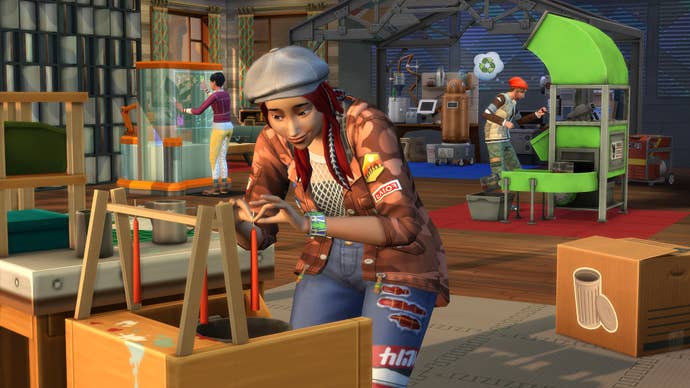Today, The Sims 4 becomes the first game in the franchise to turn 10 – and it marks a massive departure for the series and EA
Spending a full decade in active development post-release is a noteworthy milestone for a Sims game, albeit a bit of a mixed blessing.
You've probably noticed it by now if you're a fan of the life sim genre, but The Sims 4 has been doing the rounds for a long time. The original The Sims stepped aside to make way for The Sims 2 after just four years; The Sims 2 yielded to The Sims 3 after five; and the gap between The Sims 3 and The Sims 4 was another five years.
But today, The Sims 4 celebrates 10 years not only post-release but in active development: the latest expansion pack for the game came out just five weeks ago, and EA have announced plans for about a dozen more updates — both free and as paid DLC — before the end of 2024.
If you'd told us a decade ago that The Sims 4 would still be the current generation of the franchise by its 10th birthday, I doubt many of us would have believed you. Not only was EA's release cycle for the series very well-established by that point, but with the best will in the world, it's an odd place in The Sims' history to choose to park up.
The game got off to a rocky start among both critics and players, likely due to being significantly overhauled in just 18 months pre-launch to remove key shared features from 2013's SimCity reboot that proved immensely unpopular. While it wasn't exactly a disaster, initial reviews did represent the low point in a slow decline from the series' heyday, which saw both The Sims and The Sims 2 garner average review scores comfortably in the 90s, The Sims 3 drop a few marks to hang around in the 80s, and The Sims 4 receive a solid but unremarkable 70-something average.
But of course, The Sims 4 you'll download if you start playing today will be significantly different from the launch experience — even if you ignore a decade's worth of regular paid DLC releases and focus solely on the vanilla base game. Despite the increasingly eye-watering price tag of the full product, you have to give The Sims 4 its dues as the first Sims game to give away anything substantial for free — up to and including the base game itself, which went F2P on all platforms just after the game's eighth anniversary in 2022.
At the time of writing, 167 base game updates — slightly more than one per month since launch — have tweaked and twisted the original release into something still recognisable as The Sims 4 as it back in September 2014, but far more detailed and complex, with some actually quite drastic changes to the way it looks and feels.

I suspect that there's a shared root reason both for these major changes over time and the title's unexpected longevity: the way that games are sold, delivered, and monetised has changed significantly over the past decade-and-a-half, and The Sims 4 was the first game in the series to understand that it was launching into a marketplace where most players would be constantly connected to the internet as a matter of course. The Sims 3 realised this a couple of years into its lifespan, becoming the first game in the series to introduce digital-only premium DLC, and indeed went a bit overboard with the pricing of those add-ons. The Sims 4 may have cut back on the worst excesses — like $5 haircuts paid for with in-game currencies converted from real-world money. But it nevertheless shows its creators' awareness that it exists in an always-online, digital-first ecosystem that's quite different from the series' roots.
There are positives and negatives to this, of course. Gone are the bad old days of having to wait six months and fork out the cost of another full-price expansion pack if you want the fix for a bug that shipped with the last expansion pack. But it's also reduced the pressure on EA to ship something that's at least mostly-working on launch day — and, while I do think that recency bias can partly account for why The Sims 4 launches feel buggier than in previous generations, I'd also sadly point to the fact that the QA teams credited on Sims DLC releases have shrunk dramatically over the past decade, from dozens per new title to as few as six even on full-sized expansion packs.

If The Sims 4 hadn't taken advantage of the possibilities offered by being live-service-adjacent, it wouldn't just feel creaky by now, but ancient. Being able to tinker with the base game indefinitely has allowed the developers to take what was at launch a rather by-the-numbers release for the franchise and turn it into the first Sims game to feature gender and sexual orientation customisation, and cosmetic options allowing for more realistic Black hair styles, vitiligo, and medical wearables, to cite just a few examples of changes brought to Create-A-Sim alone over the past few years.
Even setting aside these worthy efforts to make this life sim feel more lifelike for everybody, The Sims 4 has had moments of brilliance, even if they've often been buried among underwhelmed reactions to this generation of the franchise as a whole. It's the first Sims game to allow upcycling, for example, or to feature social media as a career path — a unique reflection on ongoing social changes and shifting priorities over its longer-than-usual lifespan.
On a slightly more meta level, the recent introduction of Cupid's Corner — a Tinder-inspired dating app included in Lovestruck, the latest expansion pack — has been heralded as the best use of multiplayer that the franchise has yet seen, thanks to the fact that other players' creations can occasionally and unexpectedly pop up among your Sims' potential matches. It was a feature that EA didn't advertise ahead of time, but most players were pleasantly surprised to learn that Captain Jack Sparrow, Shrek, Giga Squidward, et al. were out there looking for love, same as anybody else.
When The Sims 5 arrives it will almost certainly feature multiplayer — likely more in the invite-a-friend vein of Animal Crossing: New Horizons than an MMO. Still though, it's nice to see EA experimenting with the formula ahead of time in a non-intrusive way that most players of The Sims 4 seem to be able to get behind.

The Sims and The Sims 2 are, sadly, now effectively abandonware; while The Sims 3 remains fully supported by EA on digital storefronts, but hasn't received any content updates since 2014. Project Rene (believed but not technically confirmed to be the long-awaited The Sims 5) has been very quiet lately, and while rumours of its secret cancellation are probably being exaggerated, it does seem like there's a fair bit of turmoil going on behind the scenes: what with the departure of long-time Sims producer and original game director Grant Rodiek in January, and the leak of a huge chunk of early playtest data in the spring.
So The Sims 4 has been the public face of the franchise for a full decade now, and this looks unlikely to change anytime soon — especially since, by all accounts, The Sims 4 won't be retired once Project Rene eventually releases, but is planned to continue alongside it in some capacity. Again, this might seem like a missed opportunity by EA to put the most troubled mainline game on the franchise's docket to rest, draw a line under its always-uneven reception, and try to move on. But it's worth remembering that this is still a qualitative assessment, while the 70 million-odd people who've played the game over the past decade tell a different story.
And, as I remember very well, The Sims 3 received similar levels of player backlash for the duration of its active development, but has since become extremely beloved in hindsight. I don't actually think this will happen with The Sims 4 once it's finally superseded by another title — be that Project Rene or a competitor from another studio, like inZOI or Paralives. But then, I would've said the same thing about The Sims 3 ten years ago.
In reality, it's nigh-on impossible to draw a satisfying conclusion from a retrospective look at a game that hasn't gone anywhere and is still changing all the time. Just about the only thing that's clear right now is that a lot more distance is going to be required before we can properly assess the legacy of The Sims 4 on the franchise and its community.




.jpg?width=291&height=164&fit=crop&quality=80&format=jpg&auto=webp)




